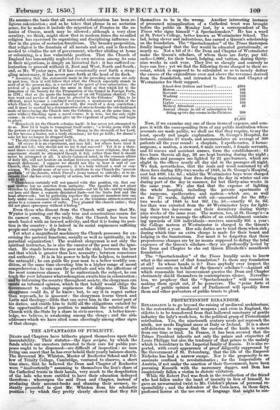THE ADVANTAGES OF PUBLICITY.
Dnuirs and Chapters have hitherto piqued themselves upon their inscrutability. Their statutes—the leges scriptce, by which the funds which our ancestors intrusted to their hare for public pur- poses ought to be dispensed—are difficult of inspection : no man living can assert that he has ever beheld their yearly balance-sheets. The Reverend Mr. Whiston, Master of Rochester School and Fel- low of Trinity College, Cambridge, ventured to observe, a short time since, that he believed the Dean and Chapter of Rochester were " inadvertently " assuming to themselves the lion's share of the Cathedral trusts in their hands, very much to the despoliation of the lads who were entitled to have their education defrayed. therefrom ; whereupon the said Dean and Chapter, instead of producing their account-books and shaming their accuser, in- stantly proceeded to eject Mr. Whiston from his scholastic position : by which they pretty clearly showed that they felt themselves to be in the wrong. Another interesting instance of presumed misapplication of a Cathedral trust was brought before the public on Monday last, by a correspondent of the Times who signs himself "A Speetaclemaker." He has a ward at St. Peter's College, better known as Westminster School. The lad, being clever and industrious, has earned a Queen's scholarship on the foundation. The " Spectaclemaker " of the Times thereupon fondly imagined that the boy would be educated gratuitously, or nearly so. Not a bit of it : the Dean and Chapter of Westminster make the Queen's scholars, of whom there are forty, pay 451. each=1,800/., for their board, lodging, and tuition, during thirty nine weeks in each year. They live as cheaply and coarsely as boys can live ; yet we find the following items charged to their ac- count, which is supposed to be calculated so as to merely defray the excess of the expenditure over and above the revenues derived from the foundation, and intrusted to the Dean and Chapter of
Westminster for their support
School-fees (tuition and board ?) £694 Matron 168 Servants 168 Washing 210 Fires 105 Lights 105 Medical Attendant 42 Annual charge in aid of subscription for fitting up two day-rooms in the Cloisters. 200 £1,692
Now, if we examine anyone of these items of expense, and com- pare it with the corresponding item of any public institution whose accounts are made public, we shall see that they require, to say the least, speedy and ample explanation. St. George's Hospital, for instance, contains 27 wards, and accommodates an average of 300 patients all the year round: a chaplain, 2 apothecaries, 2 house- surgeons, a matron, a steward, 6 male servants, 5 female servants, and 35 nurses and assistant nurses, form the establishment: 45 fires burn therein all day, 35 are kept burning during the night ; the offices and passages are lighted by 22 gas-burners, which are alight in the Offices nearly all day and in the passages all night. We find, nedertheless, that the coals and wood consumed by all these fires during fifty-two weeks of 1848, in St. George's Hospital, cost but 4891. 148. 6d. ; whilst the Westminster boys were charged 105/. for maintaining four fires during the day in winter and one during part of the day in summer, for but thirty-nine weeks in. the same year. We also find that the expense of lighting the whole hospital, including the private apartments of the surgeons, apothecaries and matron—which are as well as the 27 wards, lighted' with oil—amounted for 'the fifty- two weeks of 1848 to but 96/. 14s. 3d.—exactly 81. 58. 9d. less than was extorted from the 40 Westminster boys for light- ing their two day-rooms and their dormitory during thirty- nine weeks of the same year. The matron, too, at St George's—a lady competent to manage the affairs of an establishment contain- ing upwards of 350 individuals—receives annually 801. a year: the College matron at Westminster is charged to the Queen's scholars 1681. a year. Her sole duties are to tend them when sick; during which time an extra charge is made for their board and lodging in the Sanatorium. Nor must it be forgotten that these preposterous charges are by no means supposed to defray the total expenses of the Queen's scholars—they are professedly levied by the Dean and• Chapter to eke out Queen Elizabeth's Munificent foundation!
The " Speetaclemaker " of the Times humbly seeks• to know what is the amount of that foundation? Is there any foundation at all? In whose hands is it? Does anybody ever inspect the annual accounts on behalf of the Queen's scholars ?—Against all which reasonable but inconvenient queries the Dean and Chapter obstinately shield themselves in contemptuous silence. Neverthe- less we prophesy that the " Spectaclemaker " will succeed in malting them speak out, if he persevere. The " peine forte et dare" of Public opinion and of Parliament will speedily force them and other perverters of public trusts to plead.


























 Previous page
Previous page